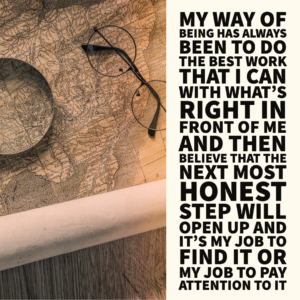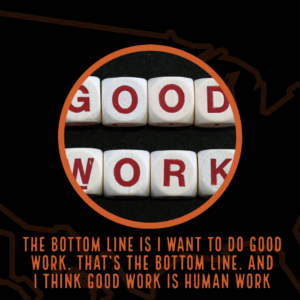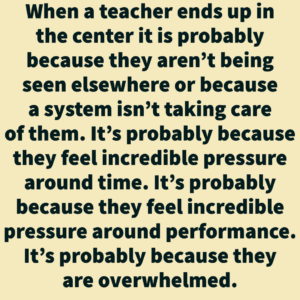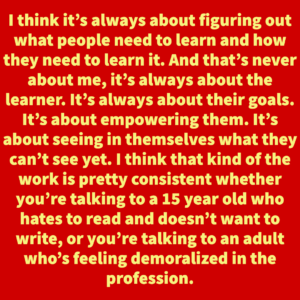174: Sarah Brown Wessling: Unfolding the Human Side of Education
Manage episode 363459115 series 3014939
As you listen, I have three listener challenges for you to consider participating in for ongoing engagement.
Listener Challenge 1: "Empowering Learners" Based on Sarah's insights, how can you apply her approach to empower learners in your own setting? Whether you're a teacher, a manager, or a parent, we'd love to hear your thoughts. Share your strategies or experiences.
Listener Challenge 2: "The Power of Story" Sarah emphasized the importance of story in various aspects of education. We challenge you to share a story that had a significant impact on your learning journey or one you've used to facilitate learning. Let's inspire each other with compelling narratives!
Listener Challenge 3: "Striking Balance" Balance may not be the right goal, as Sarah suggests, but being present is. Share a moment where being present made a difference in your professional or personal life. Or, share your strategies for staying present amid the pressures of time and performance. We look forward to hearing your experiences!
Listen Now:
- Direct Link
- Apple Podcast - Explore this episode and more!
- Spotify - Dive into this episode and our entire podcast library!
Show Highlights:
Getting to Know Sarah: Delve into Sarah Brown Wessling's intriguing backstory and discover why the human condition plays such a crucial role in her life journey.
Powerful Insights: Sarah discusses the power of story, the true complexity of teaching, and the challenges of implementing learner-centric education.
The Art of Feedback: Uncover Sarah's unique approach to feedback and its role in shaping students' skills and understanding.
Challenges & Goals: Sarah opens up about her personal and professional challenges, from balancing life to creating safe spaces for educators and empowering learners.
Key Quotes:
- "I want to do good work; that's the bottom line."
- "It's always about figuring out what people need to learn and how they need to learn it."
- "If teachers become robots, then their students are going to be robots."
- "It is complicated, and that's what I wish people understood about the craft [of teaching]."
- "You can't fall so far into the routine that you forget to be a human."
Deeper Takeaways:
Explore how Sarah's insights reveal the importance of storytelling in education, the often-overlooked skills of teachers, and the need for deliberate decision-making in teaching practices.
Emerging Patterns:
Our conversation uncovers common threads among teachers seeking connection with students, the importance of community support, and the focus on empowering learners through thoughtful teaching practices.
Resources & Further Learning:
Check out Sarah's Website for more insights and ideas.
Twitter: https://twitter.com/sarahbwessling
Favorite Moments from the Conversation:
Throughout our conversation, Sarah shares a wealth of powerful insights and ideas. Here are just a few of our favorites:
- "My way of being has always been to do the best work that I can with what's right in front of me and then believe that the next most honest step will open up and it's my job to find it or my job to pay attention to it."
- "The bottom line is I want to do good work. That's the bottom line. And I think good work is human work."
- "The throughline in the journalism, the philosophy, the psychology, the literary is story."
- "When a teacher ends up in the center it is probably because they aren't being seen elsewhere or because a system isn't taking care of them. It's probably because they feel incredible pressure around time. It's probably because they feel incredible pressure around performance. It's probably because they are overwhelmed."
- "And I taught them how to think because I taught them how to read carefully and I taught them how to write and I taught them how to find the language to capture their ideas and how to make that language mean something to a reader."
- "I think it's always about figuring out what people need to learn and how they need to learn it. And that's never about me, it's always about the learner. It's always about their goals. It's about empowering them. It's about seeing in themselves what they can't see yet. I think that kind work is pretty consistent whether you're talking to a 15 year old who hates to read and doesn't want to write, or you're talking to an adult who's feeling demoralized in the profession."
- "It's easy for me to say it's about the learner. That doesn't mean that it's easy to live."
- "Because what that means is when you feel the pressure of time, you're willing to say the time is not as important as me finishing this 60 second conversation with this student. It is just not as important or getting to the end of that chapter might not be as important as the time it would take to do the rest of the chapter really, really well. That's where the rub is that teachers have to make those kinds of decisions and those are kind of like value based decisions and they can come at a personal cost."
- "We can make very deliberate decisions about what myths we do and don't buy into, about teaching and learning. We can make really deliberate decisions about how we think about time. I think we can make really deliberate decisions about the research that we do."
- "I've always approached feedback to really deconstruct for students when they're doing something well and why it's working because I want them to replicate it more deliberately in more complex ways later."
- "You can't fall so far into the routine that you forget to be a human and you can't be on the other end of the spectrum either and be like all we're going to do is feel good and talk to each other and not drill down to the actual skills and the content. It is complicated and that's what I wish people understood about the craft."
- "Balance is an unfair goal for people to try to work towards. For me to reframe that as presence felt really empowering."
- "The best way to work through something difficult is to make a connection with another person."
- "It's really hard for somebody to be present if they are worried about not being able to take care of their life. So that's not about balance, that's just about taking care of humans."
Join us for this enlightening episode as we explore the human side of education with Sarah Brown Wessling.




216 episodes




